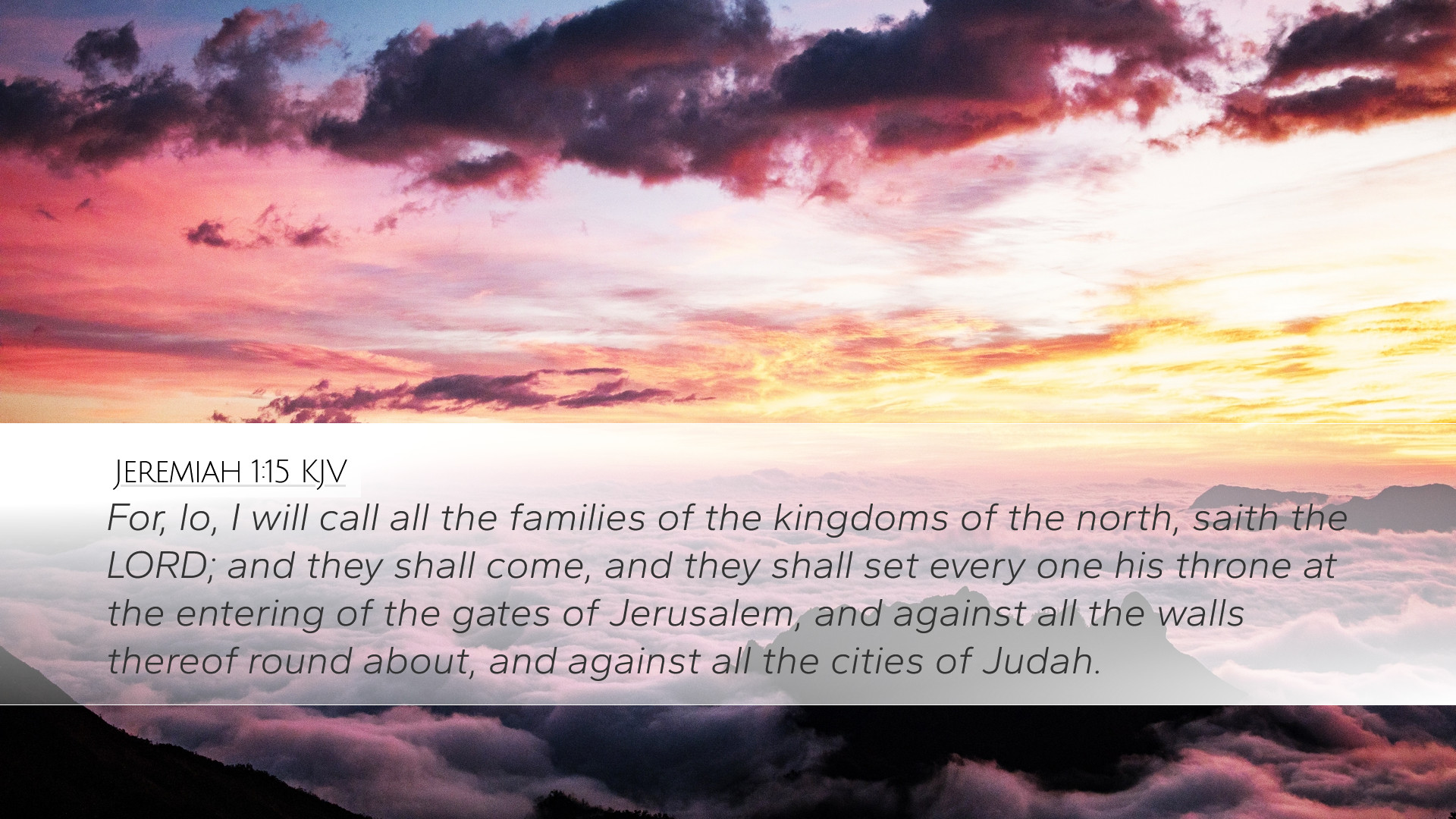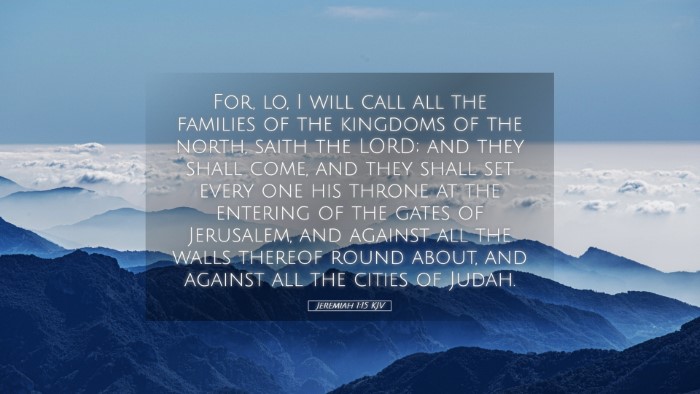Commentary on Jeremiah 1:15
Jeremiah 1:15: "For, behold, I will call all the families of the kingdoms of the north, saith the Lord; and they shall come, and they shall set every one his throne at the entering of the gates of Jerusalem, and against all the walls thereof round about, and against all the cities of Judah."
Introduction
The Book of Jeremiah is significant in both its historical and theological dimensions. As a prophetic work, it provides profound insights into God's plans and the realities of His judgment. Jeremiah 1:15 is a critical verse that outlines God's impending message of judgment upon Jerusalem and the surrounding territories due to their persistent idolatry and disobedience.
Theological Significance
Jeremiah 1:15 underscores several theological themes that resonate throughout the Scriptures:
- The Sovereignty of God: The verse demonstrates God’s authority over nations. He manipulates the affairs of kingdoms to fulfill His divine purposes.
- Judgment and Accountability: God's call to the families of the north signifies a forthcoming judgment, illustrating that nations are accountable to God's standards.
- The Role of Prophets: Prophets like Jeremiah serve as instruments through which God's will is communicated to the people, emphasizing the responsibility linked to prophetic ministry.
Historical Context
The historical backdrop of Jeremiah's prophecy is essential to understanding its full impact. At the time, Judah faced threats from Babylon and adjacent kingdoms.
- Political Turmoil: Jeremiah prophesied during a period of political instability and moral decay among the people of Judah.
- Historical Fulfillment: The northern kingdoms, particularly Babylon, would indeed come to besiege Jerusalem, fulfilling God’s pronouncement through Jeremiah.
- Family of Kingdoms: The reference to the "families of the kingdoms of the north" signifies a coalition of powers set to enact divine judgment against Jerusalem.
Commentary Insights
The following insights are offered from notable Public Domain Commentaries:
Matthew Henry's Commentary
Henry suggests that this call to the northern kingdoms highlights God's control over nations, utilizing them as instruments of His judgment. He emphasizes the stark reality that the very ones who had previously suffered under Israel's dominion (i.e., the northern kingdoms) would become the agents of divine retribution. Henry notes that this is both a warning and a reminder of God's foreknowledge.
Albert Barnes' Notes on the Bible
Barnes elaborates on the specificity of those who would come against Jerusalem, indicating that it represents not just armies but the comprehensive might of the kingdoms influenced by God’s will. He asserts that such imagery of adversaries setting their thrones at the gates highlights both the siege condition and the spiritual state of the city, which had turned its back on God, thereby rendering it vulnerable to conquest.
Adam Clarke's Commentary
Clarke provides a nuanced interpretation of the “families of the kingdoms of the north,” suggesting a reference to the multiple nations that were once united by God’s covenant blessings but had drifted into paganism and civilization’s chaos. He elaborates that the act of setting thrones around Jerusalem symbolizes not just political siege, but the dethronement of God’s authority among His chosen people. This violation catalyzes the destruction of their sanctum and covenantal relationship with Him.
Practical Applications
As contemporary readers engage with Jeremiah 1:15, several applications emerge for pastors, students, theologians, and scholars:
- Understanding God's Judgment: Recognize the seriousness of spiritual disobedience and the resultant consequences that nations may face.
- Emphasizing Prophetic Voice: Encourage the church to be attentive to the prophetic messages today and to discern God’s voice amidst societal challenges.
- Promoting Faithfulness: Urge the community to remain faithful to God's covenant, lest they become subjects of His judgment.
- Engaging in Intercessory Prayer: Encourage intercession for nations, understanding that God's mercy is a crucial aspect of His character.
Conclusion
Jeremiah 1:15 serves as a clarion call, reminding the people of God's sovereignty and the ultimate accountability of nations to His directives. The insights drawn from historical, theological, and practical perspectives underline the necessity for believers to heed God's warnings and align their lives with His will. As they navigate the complex realities of faith and culture, insights from the past can guide them in fostering a faithful response to God’s current call.


